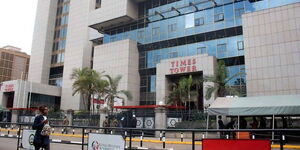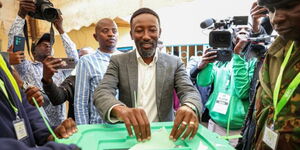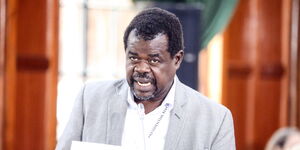Prime Cabinet Secretary Musalia Mudavadi has revealed plans to issue a diaspora bond targeting citizens living abroad, in a bid to ease pressure on public finances and strengthen the country's infrastructure needs.
According to a report from Bloomberg, the prime CS claimed that the government has kick-started talks with the World Bank to structure the bond and ensure that it is favourable.
A diaspora bond is a type of debt instrument issued by a country to raise its finances from its citizens living abroad.
If the plans sail through, the government expects to raise between $250 million (Ksh32.3 billion) and $500 million (Ksh65 billion), and then mobilise $3.8 billion (Ksh491 billion) in diaspora investments over the coming years, according to the CS.
Mudavadi affirmed that the bond will be fundamental in addressing the infrastructural needs in some key sectors, including the energy and transport sectors, and in turn catalyse the economic metamorphosis of the country.
"The conversation will be around some kind of infrastructure, maybe acceleration of rural electrification, maybe key infrastructure like the roads, the rail, or the air transport," Mudavadi claimed.
The planned bond comes at a time when the country is looking for new financing options to stimulate economic growth and lower the cost of living, factors that, in the past two years, have triggered waves of protests in the country.
According to Mudavadi, the country is also heavily exploring other revenue-generating options such as the privatization of government-owned infrastructures, public-private partnerships, and securitizing assets.
"Because of the backlash from the citizens, we concentrated more on looking at alternative ways of funding our programs as opposed to a strong revenue strategy," Mudavadi said.
"We are trying to make sure that we live within our means, knowing that it's a difficult moment even globally," he added.
According to the Central Bank of Kenya Governor Kamau Thugge, the country has already penned a letter to the International Monetary Fund (IMF) requesting to negotiate a new financing agreement.
According to Thugge, the lender will dispatch a team to the country in September to conduct a deep assessment of the country's economic and financial policies and a debt sustainability analysis.
“We are indeed having discussions with the IMF, and the government did send a letter to the IMF requesting to negotiate a new arrangement. We are expecting an IMF team to come in September to start discussions on the Article IV consultation,” Thugge said.












